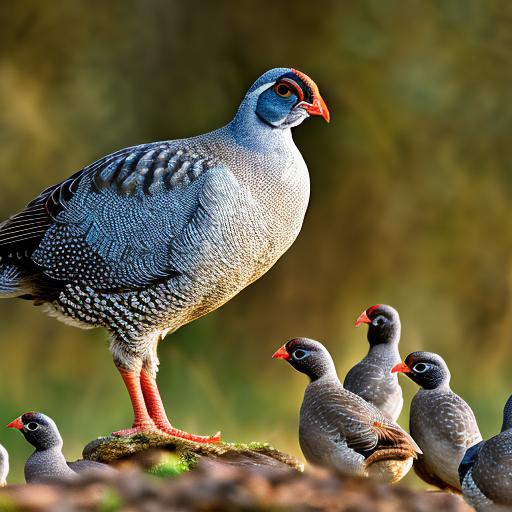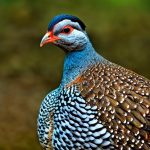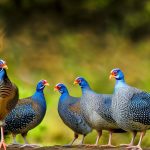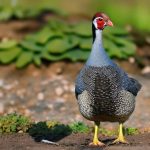Guinea fowl, also known as pintades, are domesticated birds that are native to Africa. They are popular for their unique appearance, with their speckled feathers and distinctive call. Guinea fowl are often kept for their meat, eggs, and pest control abilities. They are known for their loud calls and alert nature, making them excellent watchdogs for the home. Guinea fowl are also social birds and thrive in flocks, making them a great addition to a homestead or farm.
Guinea fowl are hardy birds that can adapt to a variety of climates, making them suitable for many different regions. They are also known for their insect-eating abilities, making them valuable for pest control in gardens and agricultural settings. Guinea fowl are relatively low maintenance compared to other poultry, making them an attractive option for those looking to add birds to their property. Overall, guinea fowl are a unique and valuable addition to any home or farm setting.
Key Takeaways
- Guinea fowl are hardy, low-maintenance birds that are known for their pest control abilities and unique calls.
- When housing guinea fowl, it’s important to provide a secure enclosure with plenty of space for them to roam and roost.
- Guinea fowl have specific dietary needs and require a balanced diet of grains, greens, and insects to thrive.
- Regular health check-ups and access to a qualified avian veterinarian are essential for maintaining the well-being of guinea fowl.
- Breeding guinea fowl requires careful consideration of mating pairs, nesting boxes, and incubation of eggs to ensure successful reproduction.
Housing and Enclosure Requirements
When it comes to housing guinea fowl, it’s important to provide them with a secure and spacious enclosure. Guinea fowl are active birds that require plenty of space to roam and forage. A good rule of thumb is to provide at least 3-4 square feet of space per bird in the coop, and even more space in the outdoor run area. The coop should be well-ventilated and provide protection from the elements, as well as predators. Guinea fowl are known for their ability to fly, so it’s important to have a covered run to prevent them from flying away.
In addition to a secure coop and run, guinea fowl also require access to a dust bath area. Dust bathing is an important behavior for guinea fowl, as it helps them keep their feathers clean and free of parasites. Providing a designated dust bathing area with sand or fine dirt will help keep your guinea fowl healthy and happy. It’s also important to provide roosting space in the coop, as guinea fowl prefer to roost off the ground at night. Overall, providing a secure and spacious enclosure with plenty of room to roam and engage in natural behaviors is essential for the health and well-being of guinea fowl.
Feeding and Nutrition
Guinea fowl are omnivorous birds that require a balanced diet to thrive. In the wild, they primarily feed on insects, seeds, and small invertebrates. When kept in captivity, it’s important to provide guinea fowl with a high-quality commercial poultry feed that is specifically formulated for their nutritional needs. Look for a feed that is high in protein, as guinea fowl require more protein than chickens. In addition to commercial feed, guinea fowl can also be supplemented with fresh fruits and vegetables, as well as mealworms or other protein-rich treats.
It’s important to provide access to fresh, clean water at all times, as guinea fowl can be prone to dehydration, especially in hot weather. Additionally, providing access to grit or small stones is important for guinea fowl, as it helps them grind their food in their gizzards for digestion. Overall, providing a balanced diet that meets the nutritional needs of guinea fowl is essential for their health and well-being.
Health and Veterinary Care
Guinea fowl are generally hardy birds that are resistant to many common poultry diseases. However, it’s still important to monitor their health and provide proper veterinary care when needed. Regular health checks can help identify any potential issues early on and prevent the spread of disease within the flock. It’s also important to provide a clean and dry living environment for guinea fowl, as this can help prevent common health issues such as respiratory infections and parasites.
In addition to regular health checks, it’s important to provide preventative care such as vaccinations and parasite control. Consult with a poultry veterinarian to develop a preventative health care plan for your guinea fowl flock. It’s also important to quarantine any new birds before introducing them to the existing flock, as this can help prevent the spread of disease. Overall, providing proper veterinary care and preventative health measures is essential for keeping guinea fowl healthy and thriving.
Breeding and Reproduction
Breeding guinea fowl can be a rewarding experience for poultry enthusiasts. Guinea fowl are seasonal layers, typically laying eggs in the spring and summer months. When breeding guinea fowl, it’s important to provide a suitable nesting area with straw or other nesting materials. Guinea hens will lay eggs in the nest and will typically incubate them for about 26-28 days before they hatch.
Once the eggs hatch, the keets (baby guinea fowl) will require special care and attention. It’s important to provide a warm brooder area with a heat lamp and access to chick starter feed. Keets can be more delicate than other poultry chicks, so it’s important to monitor their health closely and provide proper nutrition and care. As they grow, keets will require access to a secure outdoor area where they can roam and forage with supervision. Overall, breeding guinea fowl requires careful attention to nesting and incubation, as well as proper care for the keets once they hatch.
Predation and Protection
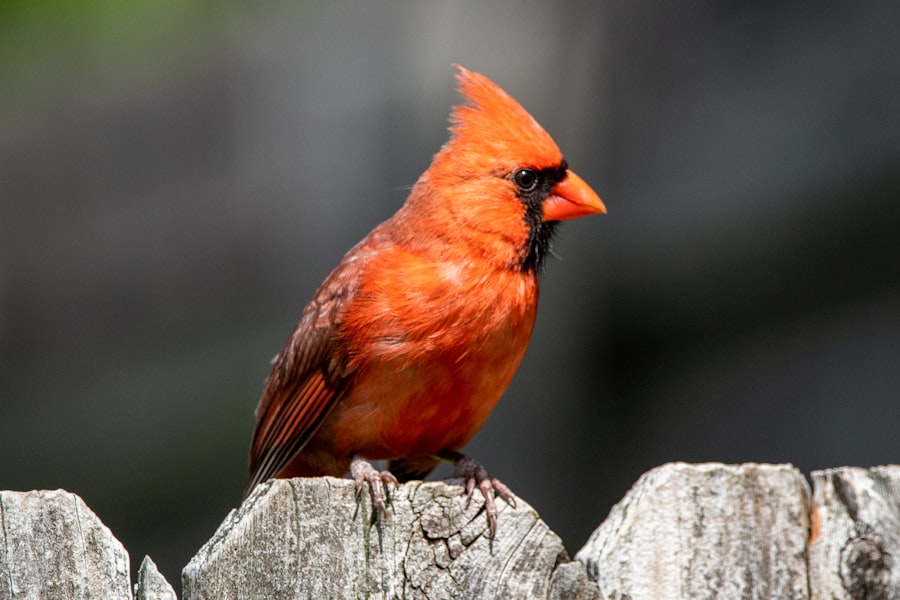
Guinea fowl are known for their alert nature and loud calls, making them excellent watchdogs for the home. They are also valuable for pest control, as they will eat insects and small rodents that may be present on the property. However, guinea fowl are also vulnerable to predation themselves, so it’s important to provide proper protection for them. This includes securing the coop and run with sturdy fencing and covering to prevent entry from predators such as foxes, raccoons, and birds of prey.
In addition to securing the enclosure, it’s important to provide roosting areas off the ground at night to protect guinea fowl from ground-dwelling predators. Providing adequate lighting around the coop can also help deter nocturnal predators. It’s also important to monitor the surrounding area for potential threats and take steps to minimize risks to the flock. Overall, providing proper protection from predators is essential for keeping guinea fowl safe and secure.
Benefits of Keeping Guinea Fowl at Home
There are many benefits to keeping guinea fowl at home or on the farm. One of the main benefits is their pest control abilities – guinea fowl are voracious insect eaters and can help keep pest populations in check in gardens and agricultural settings. They are also valuable watchdogs, alerting owners to any potential threats with their loud calls and alert nature. Additionally, guinea fowl are relatively low maintenance compared to other poultry, making them an attractive option for those looking to add birds to their property.
Guinea fowl are also valued for their meat and eggs, making them a valuable addition to a homestead or farm setting. Their unique appearance and social nature make them an interesting and entertaining addition to any property. Overall, keeping guinea fowl at home provides a range of benefits including pest control, watchdog abilities, meat and eggs, and entertainment value.
Looking to create the perfect home for your guinea fowl? While you’re at it, you might want to check out this insightful article on creating the ideal floor for your chicken coop at PoultryWizard. Just like guinea fowl, chickens also require a comfortable and safe environment, and the type of flooring in their coop can make a big difference. This article provides valuable tips and guidance on choosing the right flooring material to ensure the health and well-being of your feathered friends.
FAQs
What are guinea fowl?
Guinea fowl are a type of bird that are native to Africa. They are known for their distinctive spotted feathers and loud, chattering calls.
What do guinea fowl eat?
Guinea fowl are omnivores and eat a variety of foods including insects, seeds, grains, and small fruits. They are also known to forage for food on the ground.
How do you keep guinea fowl at home?
To keep guinea fowl at home, you will need a secure coop or shelter to protect them from predators and the elements. You will also need to provide them with access to fresh water and a balanced diet. Additionally, guinea fowl require space to roam and forage, so a large outdoor area is recommended.
What are the benefits of keeping guinea fowl at home?
Guinea fowl are known for their pest control abilities, as they eat insects such as ticks, flies, and mosquitoes. They can also provide eggs and meat for consumption.
Are guinea fowl noisy?
Yes, guinea fowl are known for their loud calls and can be quite noisy, especially when they feel threatened or are disturbed.
Do guinea fowl require special care?
Guinea fowl require basic care such as access to food, water, and shelter. They are relatively low-maintenance compared to other poultry, but they do require protection from predators and regular monitoring of their health.
Meet Walter, the feathered-friend fanatic of Florida! Nestled in the sunshine state, Walter struts through life with his feathered companions, clucking his way to happiness. With a coop that’s fancier than a five-star hotel, he’s the Don Juan of the chicken world. When he’s not teaching his hens to do the cha-cha, you’ll find him in a heated debate with his prized rooster, Sir Clucks-a-Lot. Walter’s poultry passion is no yolk; he’s the sunny-side-up guy you never knew you needed in your flock of friends!

